
Journal Menu
► ▼ Journal Menu-
- Diversity Home
- Aims & Scope
- Editorial Board
- Reviewer Board
- Topical Advisory Panel
- Instructions for Authors
- Special Issues
- Topics
- Sections & Collections
- Article Processing Charge
- Indexing & Archiving
- Editor’s Choice Articles
- Most Cited & Viewed
- Journal Statistics
- Journal History
- Journal Awards
- Conferences
- Editorial Office
Journal Browser
► ▼ Journal BrowserNeed Help?
Announcements
30 September 2025
Nobel Prize — The Science Behind the Prize
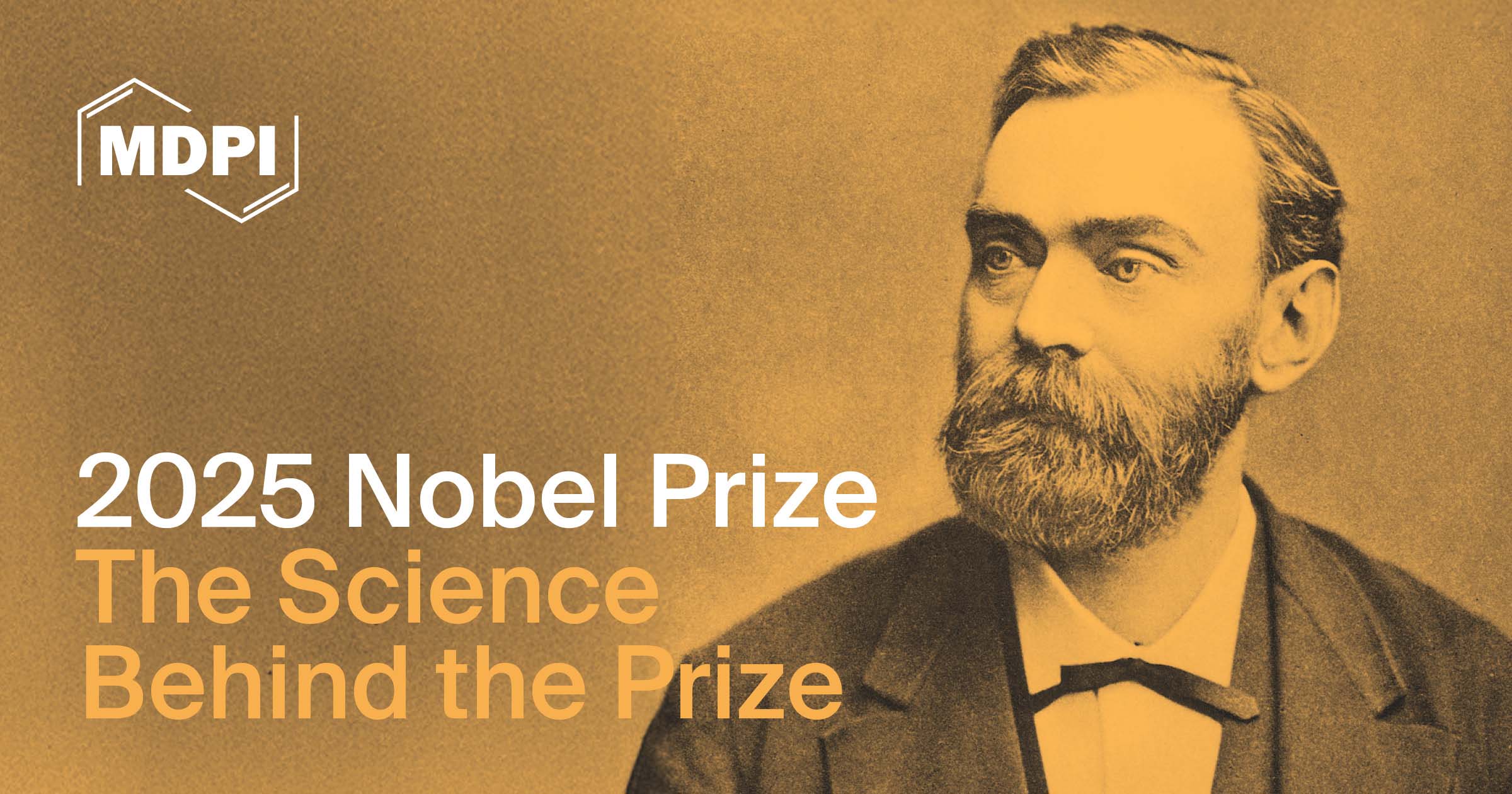
Nobel Prizes are the world’s most prestigious recognition of scientific breakthroughs, honoring discoveries that push the boundaries of knowledge and reshape entire fields. They bring into the public eye researchers whose work might otherwise remain known only within specialized circles.
For many, winning a Nobel Prize is a surreal experience. Laureates often describe a mix of joy, humility, reflection, and gratitude for the teams and collaborators whose contributions made the achievement possible. Behind every Nobel-winning idea lies years of careful, incremental work—a process that often goes unseen.
When Prof. Steven Weinberg won the Nobel Prize in Physics in October 1979, his wife Louise, a legal scholar, reminded him to keep doing the ordinary hard work of science, joking: “Now you have to write some unimportant papers.” True to form, Weinberg continued to push the boundaries of our understanding of the Universe, showing that curiosity and dedication extend far beyond the moment of recognition (Hofmann 2025: https://www.mdpi.com/2073-8994/17/6/840).
Discover the science behind the world’s most transformative ideas
Over the years, dozens of Nobel laureates have published their work with MDPI, entrusting our open access journals to disseminate their findings to a global audience. As of 2024, more than 40 laureates have contributed over 115 articles across 35 journals, ranging from pioneering research on microRNAs and mRNA therapeutics, to fundamental insights in theoretical physics, and advances in structural biology.
We regularly spotlight how Nobel Prize–winning research intersects with the contributions of our authors. This not only celebrates the achievements of the laureates, but also underscores the role of open access in ensuring that transformative science reaches the widest possible audience.
On this page, we invite you to explore selected works by Nobel laureates within the MDPI portfolio, and to join us in celebrating the global impact of their ideas.

The Nobel Prize in Physiology or Medicine 2025 will be announced on October 6 at 11:30 am CEST (at the earliest), awarded by the Nobel Assembly at Karolinska Institutet, Stockholm, Sweden. MDPI sincerely invites you to explore research in a related field.

The Science Behind the Prize: 2025 Nobel Physiology or Medicine Roundtable
6 October 2025, 03:30 pm (CEST)
Free to register for this webinar here!
The Nobel Prize in Physics 2025 will be announced on October 7 at 11:45 am CEST (at the earliest), awarded by the Royal Swedish Academy of Sciences, Stockholm, Sweden. MDPI sincerely invites you to explore research in a related field.

The Science Behind the Prize: 2025 Nobel Physics Roundtable
7 October 2025, 02:30 pm (CEST)
Free to register for this webinar here!

The Nobel Prize in Chemistry 2025 will be announced on October 8 at 11:45 am CEST (at the earliest), awarded by the Royal Swedish Academy of Sciences, Stockholm, Sweden. MDPI sincerely invites you to explore research in a related field.
30 September 2025
World Animal Day—“Save Animals, Save the Planet!”, 4 October 2025
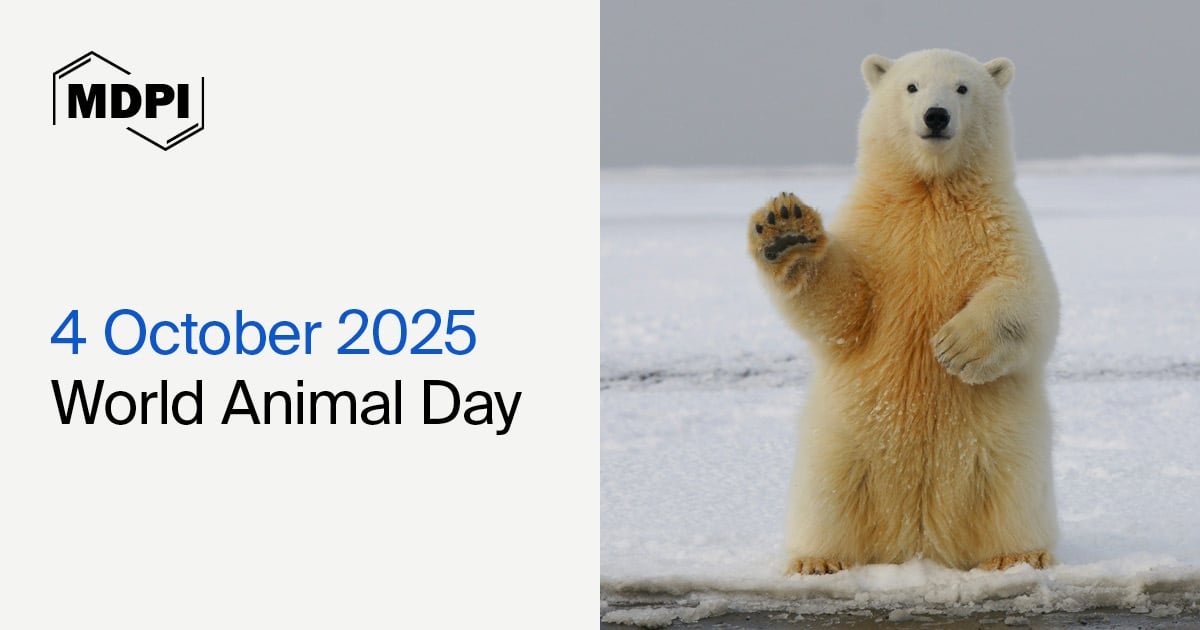
World Animal Day, which will be celebrated on 4 October, is a day that serves as a catalyst for the animal welfare movement, mobilizing it into a global force to make the world a better place for all animals by raising awareness and taking action for their well-being.
This year’s theme—“Save Animals, Save the Planet!”—draws attention to the connection between animal and environmental welfare. From biodiversity loss and habitat destruction to industrial farming and pollution, the ways we treat animals have a direct impact on the planet’s health, and vice versa. The conservation of animal species can aid in the preservation of their environment, and we must commit to the protection of both.
In recognition of World Animal Day, MDPI supports global efforts in conservation of animal life and consequently, the planet. Through open access publishing, we invite you to explore selected articles, Special Issues, and journals that span fields such as animal sciences, biology, and ecology, encouraging knowledge-sharing and collaboration with the aim of making a difference in animal welfare.

| Biology & Life Science | ● Metabolites; | Environment & Earth Sciences |
| ● Arthropoda; | ● Pets; | ● Conservation; |
| ● Animals; | ● Poultry; | ● Diversity; |
| ● Biology; | ● Ruminants; | ● Ecologies; |
| ● Birds; | ● Taxonomy; | ● Sustainability. |
| ● Fishes; | ● Veterinary Sciences; | |
| ● Insects; | ● Wild. | |
| ● JZBG; |


|
Keynote Speakers: |
||
 |
 |
 |
|
Prof. Lynne U. Sneddon, |
Dr. Subir Sarker, |
Prof. Dr. Paulo A.V. Borges, |
Free to register for this webinar here!

“Fragmented Habitats, Fragmented Functions: Unveiling the Role of Habitat Structure in Andean Bird Communities”
by Valentina Ramos-Mosquera, Edwin López-Delgado and Miguel Moreno-Palacios
Ecologies 2025, 6(3), 52; https://doi.org/10.3390/ecologies6030052
“Assessing Habitat Suitability and Overlap for South China Sika Deer and Sympatric Ungulates”
by Jing Zhang, Yankuo Li, Zhaoyang Wang, Guangyao Wang, Shizhao He, Yu Zheng and Chunlin Li
Ecologies 2025, 6(2), 41; https://doi.org/10.3390/ecologies6020041
“Monarch Butterflies in Western North America: A Holistic Review of Population Trends, Ecology, Stressors, Resilience and Adaptation”
by David G. James
Insects 2024, 15(1), 40; https://doi.org/10.3390/insects15010040
“Cetaceans in the Mediterranean Sea: Encounter Rate, Dominant Species, and Diversity Hotspots”
by Guido Gnone, Michela Bellingeri, Sabina Airoldi, Joan Gonzalvo, Léa David, Nathalie Di-Méglio,
Ana M. Cañadas, Aylin Akkaya, Tim Awbery, Barbara Mussi et al.
Diversity 2023, 15(3), 321; https://doi.org/10.3390/d15030321
Special Issues:
| “Ecology, Diversity and Conservation of Butterflies” Guest Editor: Dr. Marcin Sielezniew Submission deadline: 28 February 2026 |
“Conservation and Ecology of Polymorphic Animal Populations” Guest Editors: Prof. Dr. Luca Luiselli and Dr. Massimiliano Di Vittorio Submission deadline: 31 May 2026 |
 |
 |

“The Impacts of Traffic Intensity on Taxonomic and Functional Diversity in Understory Spiders from the Brazilian Atlantic Forest”
by Rebeca Esther Da Justa Ximenes, Matheus Leonydas Borba Feitosa, Nancy Lo-Man-Hung, Hugo Rodrigo Barbosa-da-Silva, André Otávio Silva-Junior, Alysson Henrique Alcântara Lins, Geraldo Jorge Barbosa de Moura and André Felipe de Araújo Lira
Arthropoda 2025, 3(2), 7; https://doi.org/10.3390/arthropoda3020007
“Anthropogenic Impact and Antimicrobial Resistance Occurrence in South American Wild Animals: A Systematic Review and Meta-Analysis”
by Manuel Pérez Maldonado, Constanza Urzúa-Encina, Naomi Ariyama and Patricio Retamal
Wild 2025, 2(2), 14; https://doi.org/10.3390/wild2020014
“The Evolution of Zoos as Conservation Institutions: A Summary of the Transition from Menageries to Zoological Gardens and Parallel Improvement of Mammalian Welfare Management”
by Haley N. Beer, Trenton C. Shrader, Ty B. Schidt and Dustin T. Yates
J. Zool. Bot. Gard. 2023, 4(4), 648–664; https://doi.org/10.3390/jzbg4040046
“The Hell of Wildfires: The Impact on Wildlife and Its Conservation and the Role of the Veterinarian”
by Andreia Garcês and Isabel Pires
Conservation 2023, 3(1), 96–108; https://doi.org/10.3390/conservation3010009
“Spatiotemporal Patterns of Wolves, and Sympatric Predators and Prey Relative to Human Disturbance in Northwestern Greece”
by Maria Petridou, John F. Benson, Olivier Gimenez and Vassiliki Kati
Diversity 2023, 15(2), 184; https://doi.org/10.3390/d15020184
Special Issues:
| “Conflict and Coexistence Between Humans and Wildlife” Guest Editor: Prof. Dr. Li Zhang Submission deadline: 31 March 2026 |
“The Future of Marine Megafauna” Guest Editors: Prof. Dr. Vincent L. Bels and Prof. Dr. John R. Turner Submission deadline: 31 July 2026 |
 |
 |

“Intervertebral Disc Disease in Dogs”
by Iván Gómez Álvarez, José Manuel Verdes García and Luciano Espino López
Pets 2025, 2(3), 26; https://doi.org/10.3390/pets2030026
“Dairy Farmers and Veterinarians’ Agreement on Communication in Udder Health Consulting”
by Michael Farre, Erik Rattenborg, Henk Hogeveen, Volker Krömker and Carsten Thure Kirkeby
Vet. Sci 2024, 11(12), 665; https://doi.org/10.3390/vetsci11120665
“Behavioral, Physiological and Hormonal Changes in Primiparous and Multiparous Goats and Their Kids During Peripartum”
by Paolo Cano-Suarez, Juan Pablo Damian, Rosalba Soto, Karen Ayala, Joob Zaragoza, Rocio Ibarra,
Jesús Jonathan Ramírez-Espinosa, Laura Castillo, Irma Eugenia Candanosa Aranda and Angélica Terrazas
Ruminants 2024, 4(4), 515–532; https://doi.org/10.3390/ruminants4040036
“Highly Pathogenic Avian Influenza (HPAI) H5 Clade 2.3.4.4b Virus Infection in Birds and Mammals”
by Giulia Graziosi, Caterina Lupini, Elena Catelli and Silvia Carnaccini
Animals 2024, 14(9), 1372; https://doi.org/10.3390/ani14091372
Special Issues:
| “Emerging Models in Veterinary and Comparative Pathology” Guest Editors: Dr. Karen Power and Prof. Dr. Gionata De Vico Submission deadline: 15 December 2025 |
“Advancements in Animal Reproductive Biotechnology: Protecting the Future of Endangered Wildlife Species and Domestic Breeds” Guest Editors: Dr. Amin Sayyari and Prof. Dr. Ian Mayer Submission deadline: 31 December 2025 |
 |
 |
| “Veterinary Science in Action: How Zoo and Aquarium Animals Are Diagnosed and Cured” Guest Editors: Dr. Carlos Sánchez, Dr. Richard Sim and Dr. Josie Rose Submission deadline: 30 June 2026 |
“Advances in Infectious and Parasitic Diseases of Animals” |
 |
 |

“A Poorly Known Catfish Clade in an Endangered Neotropical Biodiversity Hotspot: Relationships and Distribution Patterns of the Cambeva variegata Group (Siluriformes: Trichomycteridae)”
by Wilson J. E. M. Costa, José Leonardo O. Mattos, Valter M. Azevedo-Santos, Caio R. M. Feltrin, Pedro F. Amorim, Felipe P. Ottoni, Paulo J. Vilardo and Axel M. Katz
Fishes 2024, 9(4), 116; https://doi.org/10.3390/fishes9040116
“Description of Bisbalus, a New Genus for the Gray Brocket, Mazama cita Osgood, 1912 (Mammalia, Cervidae), as a Step to Solve the Neotropical Deer Puzzle”
by Eluzai Dinai Pinto Sandoval, Wlodzimierz J˛edrzejewski, Jesús Molinari, Miluse Vozdova, Halina Cernohorska, Svatava Kubickova, Agda Maria Bernegossi, Renato Caparroz and José Mauricio Barbanti Duarte
Taxonomy 2024, 4(1), 10–26; https://doi.org/10.3390/taxonomy4010002
“Searching for a Home Port in a Polyvectic World: Molecular Analysis and Global Biogeography of the Marine Worm Polydora hoplura (Annelida: Spionidae)”
by Vasily I. Radashevsky, Vasily V. Malyar, Victoria V. Pankova, Jin-Woo Choi, Seungshic Yum and James T. Carlton
Biology 2023, 12(6), 780; https://doi.org/10.3390/biology12060780

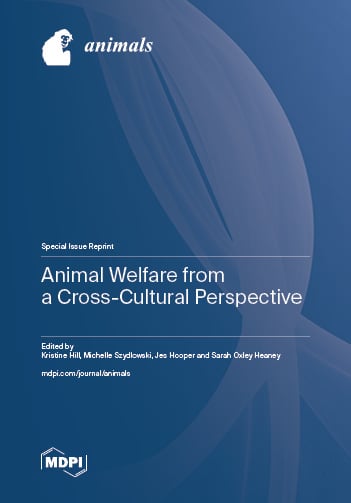 |
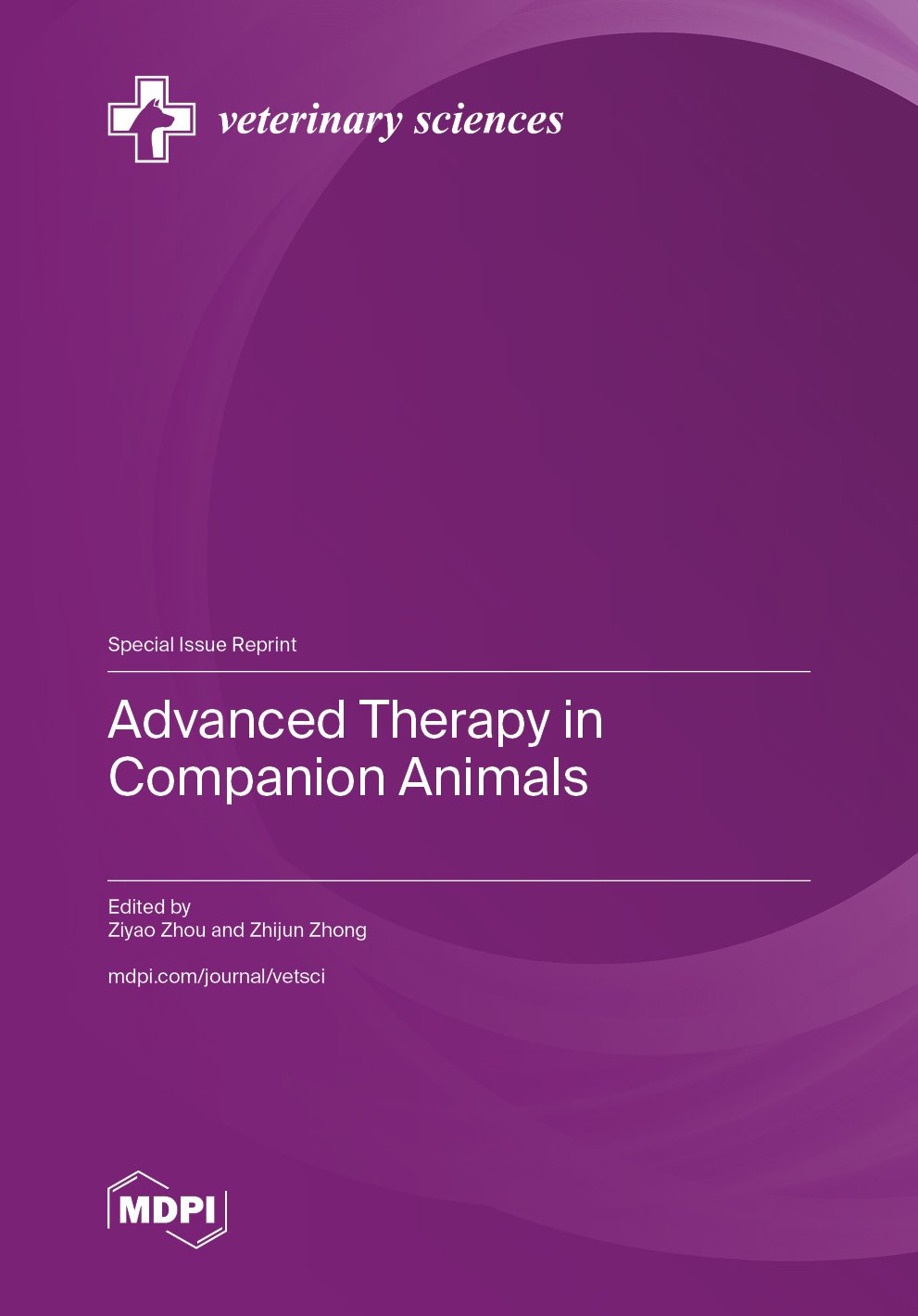 |
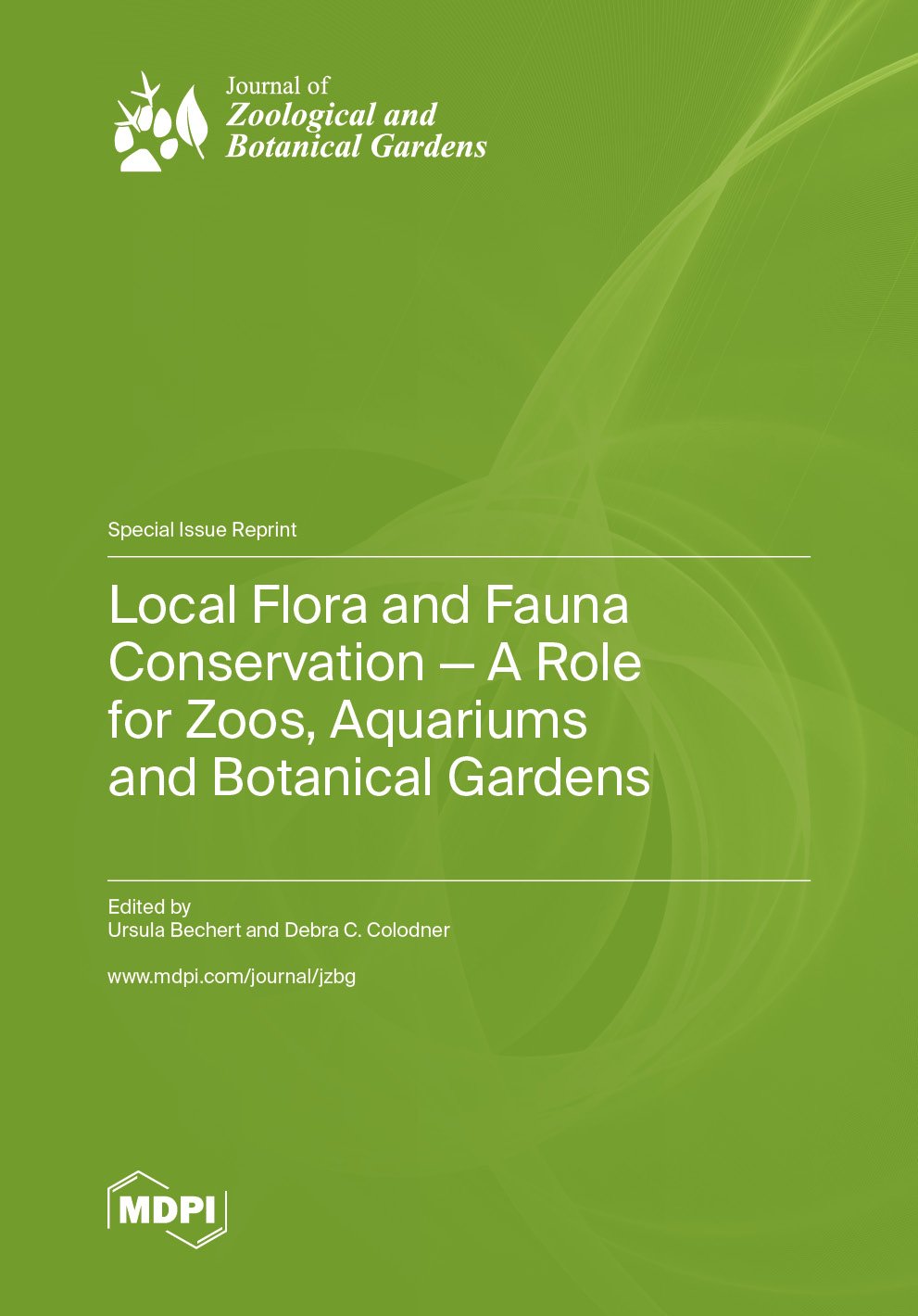 |
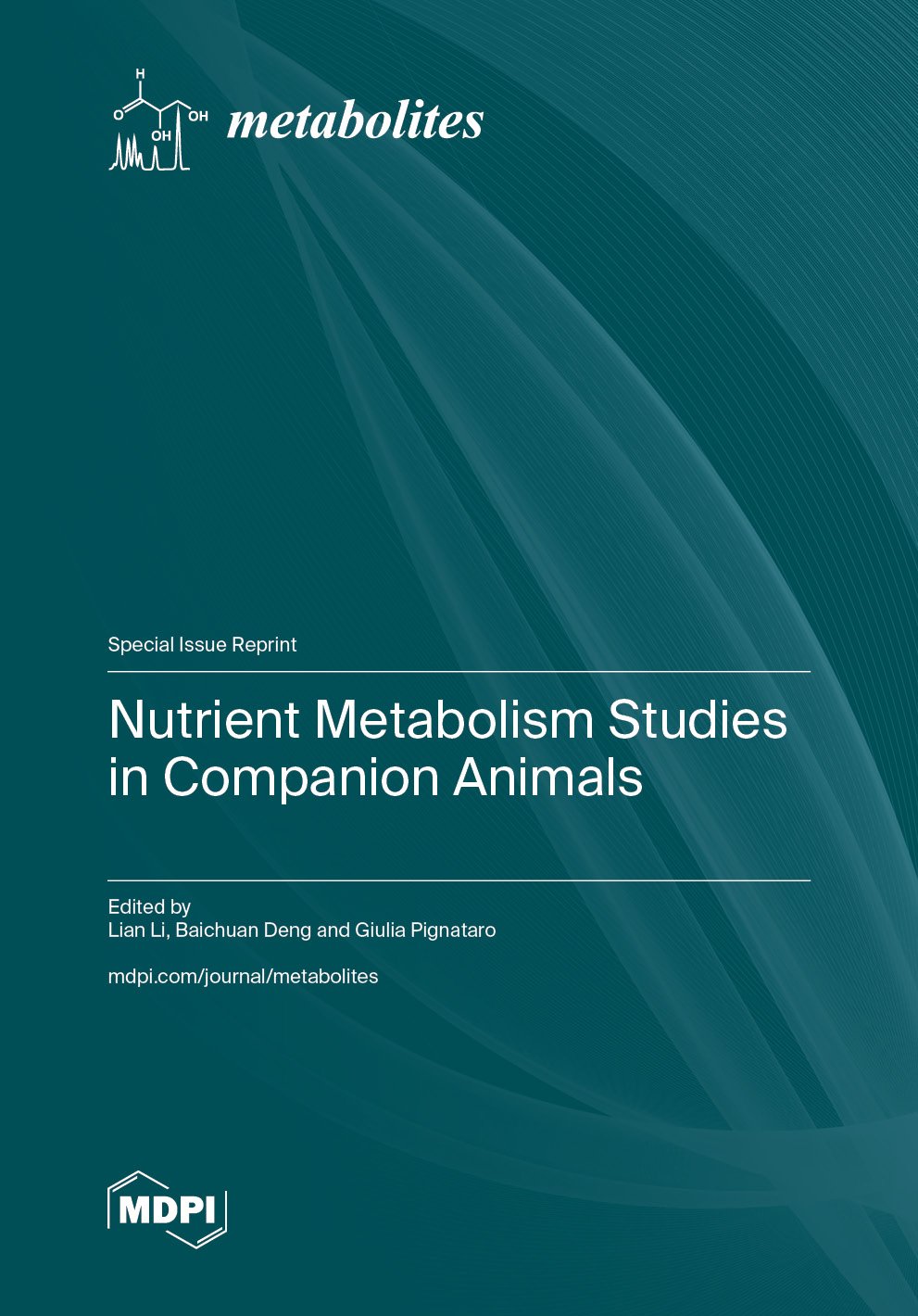 |
28 September 2025
Meet Us at the British Ecological Society Annual Meeting 2025, 15–18 December 2025, Edinburgh, UK
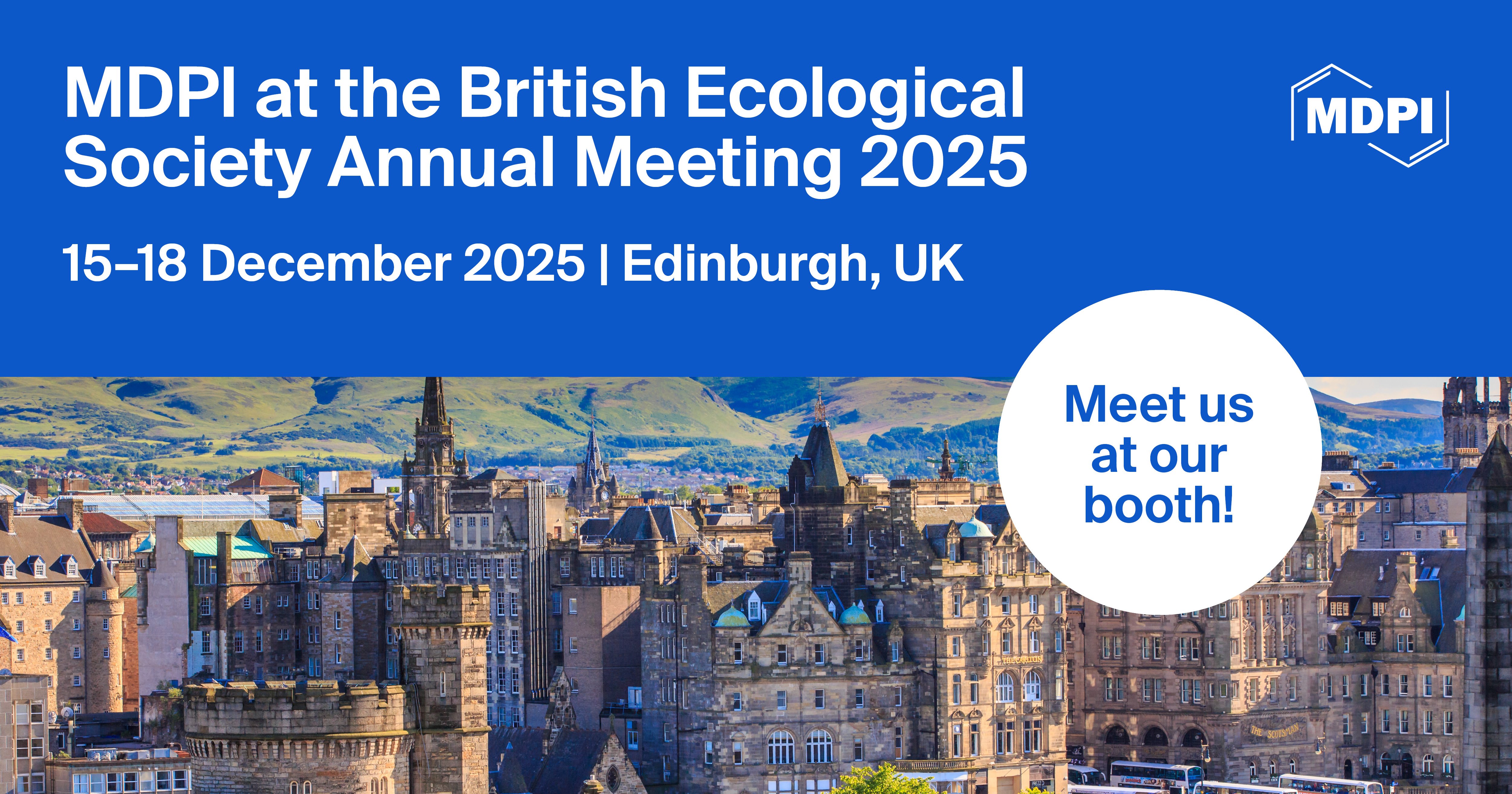
Conference: British Ecological Society Annual Meeting 2025
Date: 15–18 December 2025
Location: Lennox Suite, Edinburgh International Conference Centre, Edinburgh, UK
MDPI will be attending the British Ecological Society Annual Meeting 2025, which will be held from 15 to 18 December 2025, in Edinburgh, UK.
The British Ecological Society is the oldest ecological society in the world, and the Annual Meeting is Europe’s largest conference dedicated to ecology. Each year the Annual Meeting attracts around 1500 delegates and provides opportunities to meet new colleagues, develop your career, learn new skills, and share your science with the global ecological community. The theme of the conference for this edition contains various topics related with ecology. It will be offering an exciting programme of internationally renowned plenary speakers, diverse thematic sessions, engaging workshops, and a variety of networking events.
The following open access journals will be represented at the conference:
- Sustainability;
- Land;
- Earth;
- Hydrobiology;
- World;
- Animals;
- Fishes;
- Resources;
- Diversity;
- Climate;
- Ecologies;
- Pollutants.
If you are planning to attend the above conference, please do not hesitate to visit our booth. Our delegates look forward to meeting you in person and answering any questions that you may have. For more information about the conference, please visit the following website: https://www.britishecologicalsociety.org/content/bes-annual-meeting-2025/.
28 September 2025
MDPI’s Journal Cluster of Ecosystem and Resource Management
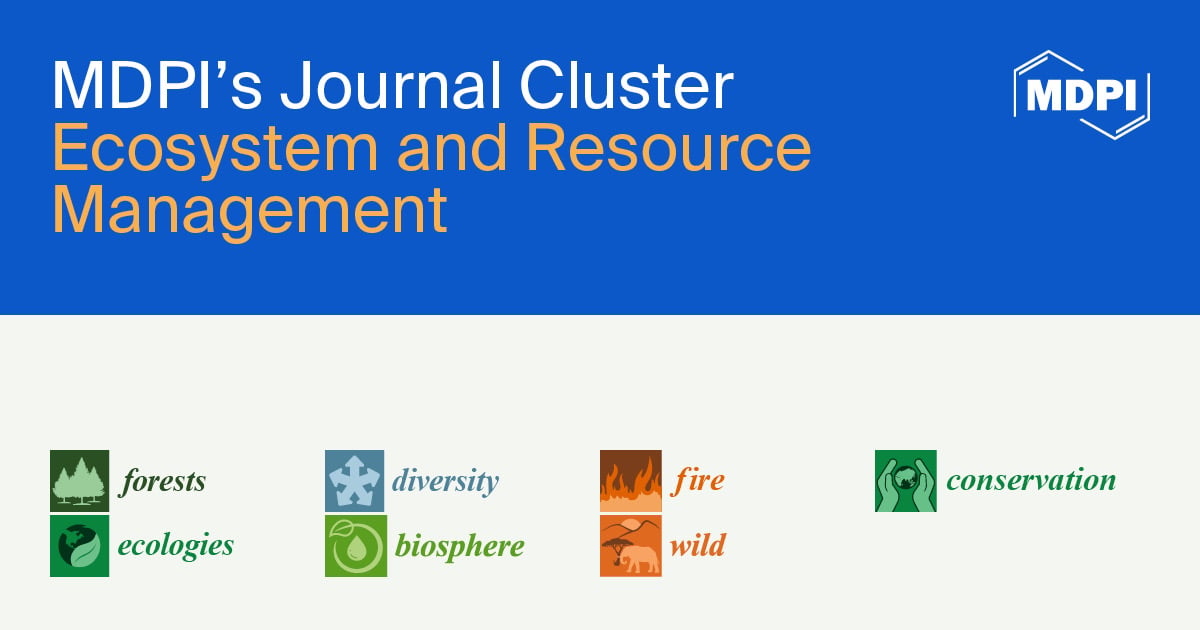
The responsible management and stewardship of Earth’s ecosystems is pivotal for preserving biodiversity of the plant and animal species inhabiting them. MDPI’s journal cluster of ecosystem and resource management contains journals that focus on individual ecosystems (e.g., Forests) as well as ecology on a broader scale. The demand for biodiversity and conservation research is growing as the world shifts to more extreme climates, and MDPI’s journals on diversity and conservation will play a larger role in making scientific discoveries more accessible to all researchers across the world.
The member journals in this cluster are as follows:
- Forests (ISSN: 1999-4907) is an international and cross-disciplinary scholarly journal of forestry and forest ecology. It publishes research papers, short communications, and review papers. The journal is indexed within Scopus, SCIE (Web of Science), Ei Compendex, GEOBASE, PubAg, AGRIS, PaperChem, and many other databases. Forests is led by its Editor-in-Chief, Prof. Dr. Giacomo Alessandro Gerosa (Catholic University of Brescia, Italy), and has 14 Sections including Forest Ecology and Management, Forest Ecophysiology and Biology, Forest Economics, Policy, Social Science, etc.;
- Diversity (ISSN: 1424-2818) is dedicated to biodiversity research, covering its concepts, applications, assessment, and conservation. The journal publishes work across all scales of biological diversity—from molecules, genes, and populations to species and ecosystems. Diversity is led by its Editor-in-Chief, Prof. Dr. Michael Wink (Heidelberg University, Germany);
- Fire (ISSN: 2571-6255) encompasses all aspects of fire and combustion: landscape fires, fire ecology, ignition sources, the wildland–urban interface, building fires, and combustion physics. It encourages submissions related to the historical, policy, and social science aspects of fire science and fire management. Fire is led by its Editor-in-Chief, Prof. Dr. Grant Williamson (University of Tasmania, Australia);
- Conservation (ISSN: 2673-7159) provides an advanced forum for conservation studies, including biodiversity and environment conservation, resource recycling, conservation and sustainable management, conservation planning and governance, conservation ethics and ecology, and creative and multidisciplinary solutions for conservation and restoration, as well as heritage conservation and restoration. Conservation is led by its Editor-in-Chief, Dr. Antoni Margalida (Pyrenean Institute of Ecology (CSIC), Spain);
- Ecologies (ISSN: 2673-4133) is an international, peer-reviewed, open access journal that publishes high-quality research across all areas of ecology. The Editor-in-Chief is Prof. Dr. José Ramón Arévalo Sierra (University of La Laguna, Spain). Ecologies welcomes original research articles and reviews that advance theoretical and applied understanding of ecological processes at the levels of individuals, populations, communities, ecosystems, and their interactions with the environment. Topics of interest include, but are not limited to, ecosystem functioning, biodiversity conservation, ecological modeling, ecological restoration, global change ecology, and the impacts of human activities on ecosystems;
- Biosphere (ISSN: 3042-6111) focuses on publishing advances in scientific understanding of ecosystems and ability to project their future conditions for sustainable management and stewardship of the global ecosystem. By bringing together the insights of researchers worldwide, Biosphere emphasizes biodiversity, global change, and the interconnected roles of the lithosphere, atmosphere, and hydrosphere in creating favorable conditions for life. Biosphere is led by its Editor-in-Chief, Dr. Ghassem R. Asrar (iCREST Environmental Education Foundation, USA);
- Wild (ISSN: 3042-4526) deals with all aspects related to nature, including natural environments, renaturalization, restoration, wild species, ethical game, fishing, and other uses of natural resources. The journal also aims to highlight the traditions of Indigenous people that do not destroy primary habitats, integral protected areas, and the places and people symbolizing ecological ethics or (wild) nature protection and restoration. Wild is led by its Editor-in-Chief, Dr. Kevin Cianfaglione (Université Catholique de Lille, France).
MDPI’s mission and values:
As a pioneer of academic open access publishing, MDPI has been serving the scientific community since 1996. Our aim is to foster scientific exchange in all forms, across all disciplines. MDPI’s guidelines for disseminating open science are based on the following values and guiding principles:
- Open Access—All of our content is published as open access and distributed under a Creative Commons License, providing free access to science and the latest research, allowing articles to be freely shared and content to be re-used with proper attribution;
- Timeliness and Efficiency—Publishing the latest research through thorough editorial work, ensuring a first decision is provided to authors in under 32 days and papers are published within 7–10 days upon acceptance;
- Simplicity—Offering user-friendly tools and services in one place to enhance the efficiency of our editorial process;
- High-Quality Service—Supporting scholars and their work by providing a range of options such as journal publication at mdpi.com, early publication at preprints.org, and conferences on sciforum.net to make a positive impact on research;
- Flexibility—Adapting and developing new tools and services to meet the changing needs of the research community, driven by feedback from authors, editors, and readers;
- Rooted in Sustainability—Ensuring the long-term preservation of published papers and supporting the future of science through partnerships, sponsorships, and awards.
By adhering to these values and principles, MDPI remains committed to advancing scientific knowledge and promoting open-science practices.
Selected Topic and Special Issues:
- “Conservation at the Crossroads: Forest Ecology, Wildlife Dynamics, and Emerging Challenges for Ecosystem Resilience”;
- Topic Editors: Dr. Yiannis G. Zevgolis, Dr. Triantaphyllos Akriotis, Dr. Anastasia Christopoulou, Prof. Dr. Panayiotis G. Dimitrakopoulos, Dr. Dimitra-Lida Rammou and Prof. Dr. Dionisios Youlatos;
- Deadline for manuscript submissions: 31 July 2026;
- “Classification of Forest Tree Species Using Remote Sensing Technologies: Latest Advances and Improvements”;
- Guest Editors: Dr. Udayalakshmi Vepakomma and Prof. Dr. Costas Armenakis;
- Deadline for manuscript submissions: 13 February 2026;
- “The Applications of Emerging Technologies on Biodiversity Conservation”:
- Guest Editors: Dr. Xinhai Li and Prof. Dr. Guiming Wang;
- Deadline for manuscript submissions: 31 January 2026;
- “Current Advances in the Assessment and Mitigation of Fire Risk in Buildings and Urban Areas: 2nd Edition”:
- Guest Editor: Dr. Tiago Miguel Ferreira;
- Deadline for manuscript submissions: 30 April 2026;
- “Conservation Biology, Management of Natural Resources, and Protected Areas Policies”:
- Guest Editor: Dr. Kevin Cianfaglione;
- Deadline for manuscript submissions: 30 April 2026;
- “Microhabitat Diversity and Beetle Conservation in Managed Forests”:
- Guest Editor: Dr. Francesco Parisi;
- Deadline for manuscript submissions: 31 December 2025;
- “Sustainable and Resilient Biosphere”
- Guest Editor: Dr. Ghassem R. Asrar;
- Deadline for manuscript submissions: 31 August 2026.
Selected Articles:
Forests
“Forest-Cover Changes in European Natura 2000 Sites in the Period 2012–2018”
by Antonio Santoro, Francesco Piras, Beatrice Fiore, Alessandra Bazzurro and Mauro Agnoletti
Forests 2024, 15(2), 232; https://doi.org/10.3390/f15020232
Diversity
“Soil Microorganisms: Their Role in Enhancing Crop Nutrition and Health”
by Qingxia Chen, Yingjie Song, Yuxing An, Yinglin Lu and Guohua Zhong
Diversity 2024, 16(12), 734; https://doi.org/10.3390/d16120734
Fire
“Investigation into the Computational Analysis of High–Speed Microjet Hydrogen–Air Diffusion Flames”
by Ali Cemal Benim
Fire 2024, 7(9), 314; https://doi.org/10.3390/fire7090314
Conservation
“A Machine Learning Approach to Map the Vulnerability of Groundwater Resources to Agricultural Contamination”
by Andreia Garcês and Isabel Pires
Conservation 2024, 4(2), 307-318; https://doi.org/10.3390/conservation4020020
Ecologies
“Soil and Sediment Organisms as Bioindicators of Pollution”
by Samir Ghannem, Ons Bacha, Sondes Fkiri, Sabri Kanzari, Abdelwaheb Aydi and Samir Touaylia
Ecologies 2024, 5(4), 679-696; https://doi.org/10.3390/ecologies5040040
Biosphere
“Monitoring Wise Use of Wetlands During Land Conversion for the Ramsar Convention on Wetlands: A Case Study of the Contiguous United States of America (USA)”
by Elena A. Mikhailova, Hamdi A. Zurqani, Lili Lin, Zhenbang Hao, Christopher J. Post, Mark A. Schlautman, Gregory C. Post, Camryn E. Brown and George B. Shepherd
Biosphere 2025, 1(1), 2; https://doi.org/10.3390/biosphere1010002
Wild
“Assessing Species Richness with Camera Trap Surveys During Five Years of Large-Scale Mining Disruptions”
by Ruan W.Higgs and Francois Deacon
Wild 2024, 1(1), 82-95; https://doi.org/10.3390/wild1010007
28 September 2025
Meet Us at the 11th World Sustainability Forum, 2–3 October 2025, Barcelona, Spain
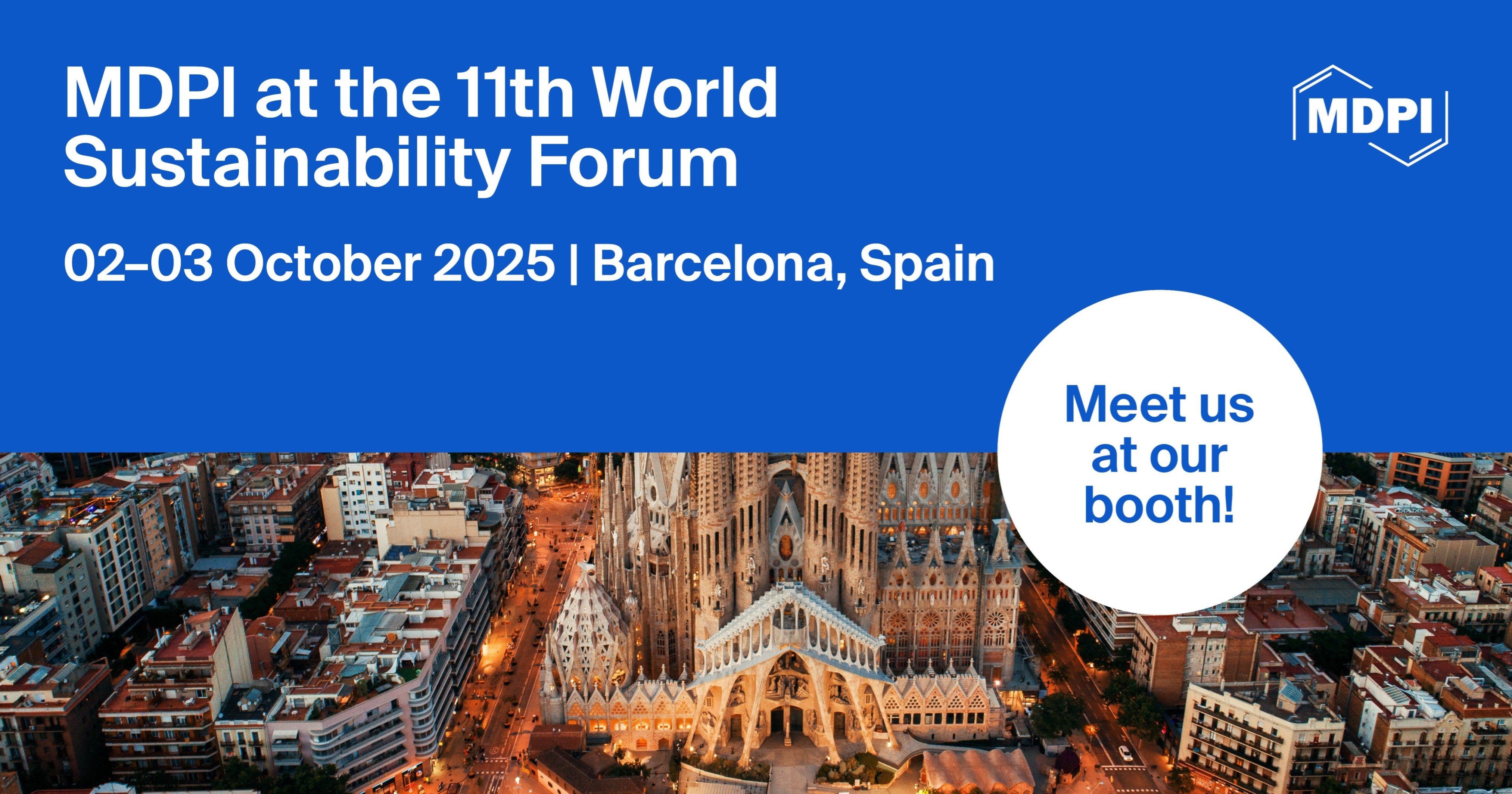
Conference: The 11th World Sustainability Forum
Organization: MDPI, Sustainability
Date: 2–3 October 2025
Place: Barcelona, Spain
The 11th World Sustainability Forum (WSF11) will be a 48-hour event held in Barcelona, Spain, and it stands as a catalyst for urban resilience and environmental sustainability, with a clear focus on forging partnerships and harnessing innovation to create novel solutions for today’s most urgent sustainability challenges. It provides a platform where ideas and visions are translated into concrete solutions for measurable progress in ecology, sustainability and environmental development.
The following open access journals will be represented:
If you plan on attending this conference, please feel free to stop by our booth. Our delegates look forward to meeting you in person and answering any questions you may have.
For more information about the conference, please visit the following link: https://sciforum.net/event/WSF-11.
28 September 2025
MDPI Webinar | World Animal Day, 3 October 2025
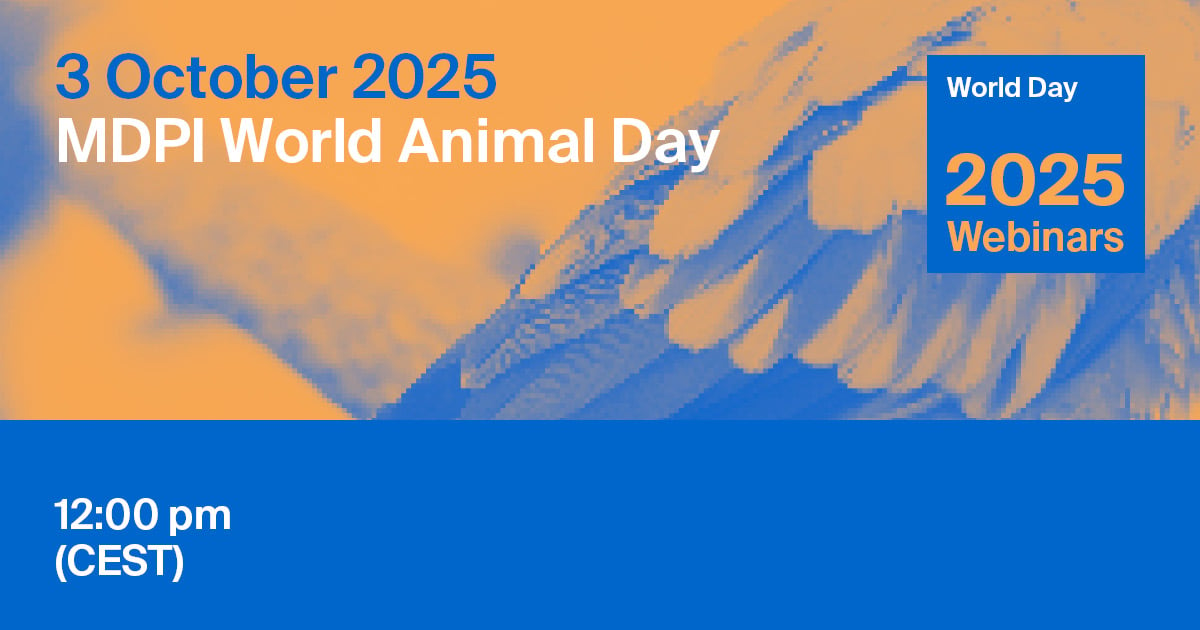
In order to commemorate MDPI World Animal Day 2025, MDPI is launching a special webinar to encourage researchers to come together and raise awareness for the animal welfare movement and contribute to the global force that is working to make the world a better place for all animals.
This year’s theme—“Save Animals, Save the Planet!”—draws attention to the connection between animal welfare and environmental welfare. From biodiversity loss and habitat destruction to industrial farming and pollution, the ways we treat animals have a direct impact on the planet's health, and vice versa. The conservation of animal species can aid in the preservation of their environment, and we must wholeheartedly commit to the protection of both.
Date: 3 October 2025 at 12:00 p.m. CEST | 6:00 p.m. CST (Asia) | 6:00 a.m. EDT
Webinar ID: 826 4600 8905
Website: https://sciforum.net/event/WAD2025
Register now for free!
Program:
|
Speaker/Presentation |
Time in CEST |
Time in CST Asia |
|
Introduction |
12:00–12:10 p.m. |
6:00–6:10 p.m. |
|
Prof. Lynne U. Sneddon |
12:10–12:30 p.m. |
6:10–6:30 p.m. |
|
Dr. Subir Sarker |
12:30–12:50 p.m. |
6:30–6:50 p.m. |
|
Prof. Dr. Paulo A. V. Borges |
12:50–1:10 p.m. |
6:50–7:10 p.m. |
|
Q&A Session |
1:10–1:25 p.m. |
7:10–7:25 p.m. |
|
Closing of Webinar |
1:25–1:30 p.m. |
7:25–7:30 p.m. |
After registering, you will receive a confirmation email containing information on how to join the webinar. Registrations with academic institutional email addresses will be prioritized.
Unable to attend? Register anyway, and we will let you know when the recording is available to watch.
Webinar Speakers:
- Dr. Lynne U. Sneddon, Department of Biological & Environmental Sciences, University of Gothenburg, Sweden;
- Dr. Subir Sarker, College of Medicine and Dentistry, James Cook University, Australia;
- Prof. Dr. Paulo A. V. Borges, School of Agrarian and Environmental Sciences, University of the Azores, Portugal.
22 September 2025
Topics Webinar | Anthropogenic Impacts in Marine Coastal Waters: Assessment, Case Studies and Solutions, 26 September 2025

MDPI invites all esteemed experts to join the webinar entitled “Anthropogenic Impacts in Marine Coastal Waters: Assessment, Case Studies and Solutions”.
Marine coastal environments are increasingly vulnerable to anthropogenic pressures such as pollution, habitat degradation and climate change, underscoring the urgent need for regular assessment, careful monitoring and regionally tailored conservation measures. Addressing these challenges requires steadfast collaboration and a multidisciplinary approach, engaging scientific research, technical innovation and the involvement of local communities.
Our distinguished speakers will share diverse perspectives. Prof. Dr. Weiqi Fu will focus on microalgae applications for ecological and biotechnological studies; Prof. Dr. João Pedro Barreiros will discuss the effectiveness of marine protected areas; and Prof. Dr. Pamela Hallock will talk about the role of reef-associated Foraminifera in addressing sea-level rise in Mediterranean waters.
Join us for this insightful session, where innovative research meets real-world solutions, offering valuable perspectives for scientists and practitioners dedicated to marine conservation and sustainability.
We look forward to your participation in this event.
Webinar: Anthropogenic Impacts in Marine Coastal Waters: Assessment, Case Studies and Solutions
Date: 26 September 2025
Time: 14:00–15:30 (CEST) | 20:00–21:30 (CST Asia)
Webinar ID: 823 8400 5897
More information: https://sciforum.net/event/Topics-43
Register for free via the following link:
Program:
|
Speaker/Presentation |
Time in CEST |
Time in CST (Asia) |
|
Prof. Dr. Alberta Mandich (Chair) |
14:00–14:10 |
20:00–20:10 |
|
Prof. Dr. Weiqi Fu |
14:10–14:30 |
20:10–20:30 |
|
Prof. Dr. João Pedro Barreiros |
14:30–14:50 |
20:30–20:50 |
|
Prof. Dr. Pamela Hallock (Muller) |
14:50–15:10 |
20:50–21:10 |
|
Q&A Session |
15:10–15:25 |
21:10–21:25 |
|
Prof. Dr. Alberta Mandich (Chair) |
15:25–15:30 |
21:25–21:30 |
After registering, you will receive a confirmation email containing information on how to join the webinar. Registrations with academic or institutional email addresses will be prioritized.
Unable to attend? Feel free to still register; we will inform you when the recording is available.
Webinar Chair and Keynote Speakers:
- Prof. Dr. Alberta Mandich, Interuniversity Consortium of Structural and Systems Biology (INBB), Rome, Italy;
- Prof. Dr. Weiqi Fu, Department of Marine Science, Ocean College, Zhejiang University, Zhoushan, China;
- Prof. Dr. João Pedro Barreiros, Faculty of Agricultural Sciences and the Environment, University of the Azores, Angra do Heroísmo, Portugal;
- Prof. Dr. Pamela Hallock (Muller), College of Marine Science, University of South Florida, St Petersburg, USA.
Relevant Topic:
“Anthropogenic Impacts in Marine Coastal Waters: Assessment, Case Studies and Solutions”
Topic Editors: Prof. Dr. Alberta Mandich and Dr. Jessica Alessi
Abstract submission deadline: 30 June 2025 (closed)
Manuscript submission deadline: 30 September 2025
For more information about this webinar, please visit the following link: https://sciforum.net/event/Topics-43.
If you have any questions about this webinar, please contact journal.webinar@mdpi.com.
19 September 2025
Diversity | Special Issue Mentor Program

We are pleased to announce the launch of a new initiative—the Diversity Special Issue Mentor Program.
This program will enable early career researchers (holding a PhD in a related field) to gain experience editing a Special Issue in Diversity (ISSN: 1424-2818) under the mentorship of our experienced Editorial Board Members or other experienced scientists. The mentor program will provide an excellent opportunity for early career scientists to gain editorial experience and to cultivate their ability to edit scientific research. It is important to note that, within this program, the mentor will hold the title of Guest Editor (GE), while the mentee will be recognized as the Guest Editor Assistant (GEA).
The mentee’s responsibilities include:
- Proposing a Special Issue title and assisting the mentor in preparing a summary (around 200–400 words) and 3–10 keywords describing the background, importance, and goal of the Special Issue;
- Writing a brief promotion plan for the Special Issue;
- Preparing a list of scholars that may be interested in the Special Issue and personally e-mailing invitations on behalf of Guest Editors;
- Writing an editorial for the online Special Issue in collaboration with the mentor;
- Providing opinions and suggestions to the GE mentor to assist them with making their final decisions (please note that mentees cannot make decisions during paper processing and will not be listed in the published papers as an Academic Editor).
The mentor’s responsibilities include:
- Conducting a final check before the Special Issue is published online;
- Performing editorial checks of the Special Issue and quality control of the publications in a timely manner;
- Providing suggestions to younger scholars if they have any doubts or concerns regarding submissions;
- Regularly organizing video calls with young scholars and the Editorial Office to discuss problems and suggestions for the Special Issue;
- Making and finalizing submission decisions under the supervision of mentors.
Certificates:
After the Special Issue is released, the Editorial Office will provide official certificates for all the mentors and mentees.
If you are interested in this opportunity, please send your Special Issue proposal to the Diversity Editorial Office for further details (i.e., mentor collaboration, Special Issue topic feasibility analysis, etc.).
In addition to the new Special Issue Mentor Program, Diversity will continue to welcome all Special Issue proposals focusing on hot research topics.
12 September 2025
Empowering Academic Growth with MDPI Academic Publishing Workshop at Mahasarakham University, 2 October 2025, Maha Sarakham, Thailand

We are thrilled to announce the inaugural Academic Publishing Workshop—a groundbreaking collaboration between MDPI’s journal Diversity (ISSN: 1424-2818) and Mahasarakham University (MSU), marking a historic milestone in our shared commitment to advancing the science of biodiversity through molecules, genes, populations, and species.
This landmark event symbolizes more than a partnership; it is the foundation of a sustained, collaborative initiative designed to empower scholars across Thailand and the broader international academic community. By fostering innovation in peer review, refining strategies for high-impact manuscript development, and enabling direct dialogue with journal editors, this workshop will equip participants—particularly early-career researchers—with the tools to elevate their academic visibility and forge enduring global research networks.
Seize this unparalleled opportunity to join the MDPI Academic Publishing Workshop, rooted in academic rigor and poised to redefine the trajectory of biodiversity science for years to come.
Date: 2 October 2025
Time: 2:00–4:30 p.m.
Location: Co-Working Space MBS, Mahasarakham Business School, Mahasarakham University
Language: Thai
Registration: https://www.surveymonkey.com/r/L6DTFYP
Program:
|
Speaker |
Program |
Time |
|
Professor Dr. Pairot Pramual, |
Opening Speech
|
2:00—2:10 p.m. |
|
Mr. Pongsakorn Vithayanon |
MDPI and Diversity Journal Introduction |
2:10—2:30 p.m. |
|
Dr. Krit Inthajak |
How to Write Scientific Papers |
2:30—3:00 p.m. |
|
|
Q&A Session |
3:00—3:10 p.m. |
|
Ms. Hathaipat Kittirojana |
How to Respond to Peer Reviewers |
3:10—3:40 p.m. |
|
|
Q&A Session |
3:40—3:50 p.m. |
|
Ms. Ploy Assavajamroon |
Publication Ethics for Authors |
3:50—4:20 p.m. |
|
|
Q&A Session |
4:20—4:30 p.m. |
|
Chair |
Biography |
|
|
Assoc. Prof. Dr. Weerachai Saijuntha received his PhD in medical biochemistry from Khon Kaen University, Thailand. He is a lecturer at the Faculty of Medicine, Mahasarakham University. His research interests include the molecular systematics and population genetics of terrestrial animals, parasites, and vectors in Southeast Asia, with a main focus on pathogenic parasites and their snail intermediate hosts. He has been active in genetic variation research of medically important trematodes and the bithyniid snails for 15 years and has published over 90 peer-reviewed original research articles, reviewer articles, and book chapters. Resulting from this research, he has received a number of national and international awards for his work. |
MDPI speakers:
|
Speaker |
Biography |
|
|
Mr. Pongsakorn Vithayanon obtained his master's degree in food biotechnology from the Faculty of Biotechnology, Assumption University, USA. He joined MDPI in February 2023 as an Assistant Editor for IJMS. He was appointed as a Section Managing Editor in 2024 and worked as a Group Leader from 2024 to present. He is now one of MDPI’s Journal Relations Specialists for the Editorial Office of IJMS. |
|
|
Ms. Ploy Assavajamroon obtained her master’s degree in chemistry from Thammasat University in 2020 and joined MDPI as an Assistant Editor for the journal Crystals in the same year. She became a Section Managing Editor in 2021 and a Group Leader in 2022. She is currently one of MDPI's Regional Journal Relations Specialists for the Asia–Pacific region. |
|
|
Ms. Hathaipat Kittirojana obtained her master’s degree in food science and biotechnology from Teesside University. She joined MDPI in December 2020 as an Assistant Editor for the Journal of Imaging. She was appointed as a Section Managing Editor in March 2023 and a Regional Journal Relations Specialist for the Asia–Pacific region in July 2024. |
|
|
Dr. Krit Inthajak obtained his PhD in engineering and technology from Sirindhorn International Institute of Technology, Thammasat University. He joined MDPI in March 2020 as an Assistant Editor for Molecules. He was appointed as a Section Managing Editor in 2021 and worked as a Group Leader from 2021 to 2024. He is now one of MDPI's Regional Journal Relations Specialists for the Asia–Pacific region. |
3 September 2025
Join Us at the MDPI at the University of Toronto Career Fair, 23 September 2025, Toronto, ON, Canada

Date: 23 September 2025
Time: 11:00 a.m.–4:30 p.m
Location: The Chelsea Hotel, 33 Gerrard Street West, Toronto
MDPI is thrilled to announce our participation in the University of Toronto’s largest career fair, taking place at the St. George Downtown Campus. This exciting event brings together thousands of students, graduates, and professionals looking to connect with top employers and explore career opportunities.
We invite all attendees to visit the MDPI booth to discover how you can be part of one of the world’s leading open access academic publishers. Whether you are passionate about scientific research, editorial work, marketing, or supporting global innovation in publishing, we want to meet YOU!
What to expect at our booth:
- Learn more about MDPI’s mission and global impact;
- Explore exciting career opportunities in publishing, editorial, communications, and more;
- Network with our team and ask questions about working at MDPI.
Whether you’re just starting your career or looking to take the next step, don’t miss this opportunity to connect with MDPI. Bring your resume, your curiosity, and your questions—we look forward to seeing you there!
For additional information on the Career Fair and Open MDPI positions, please visit the following links:



















